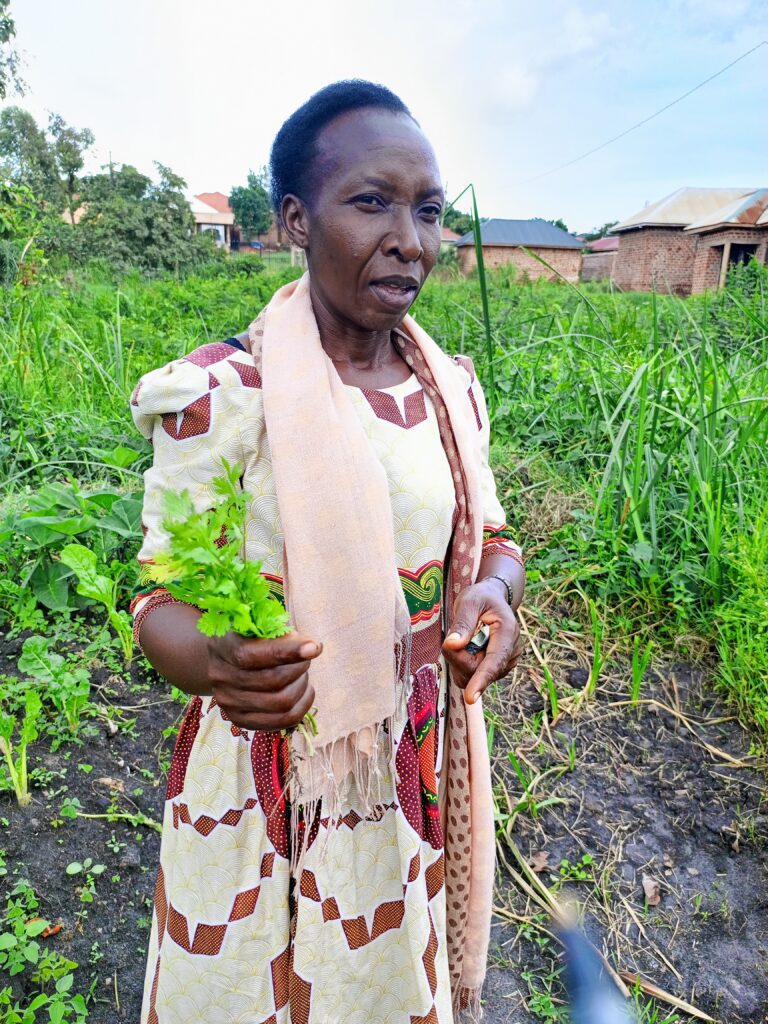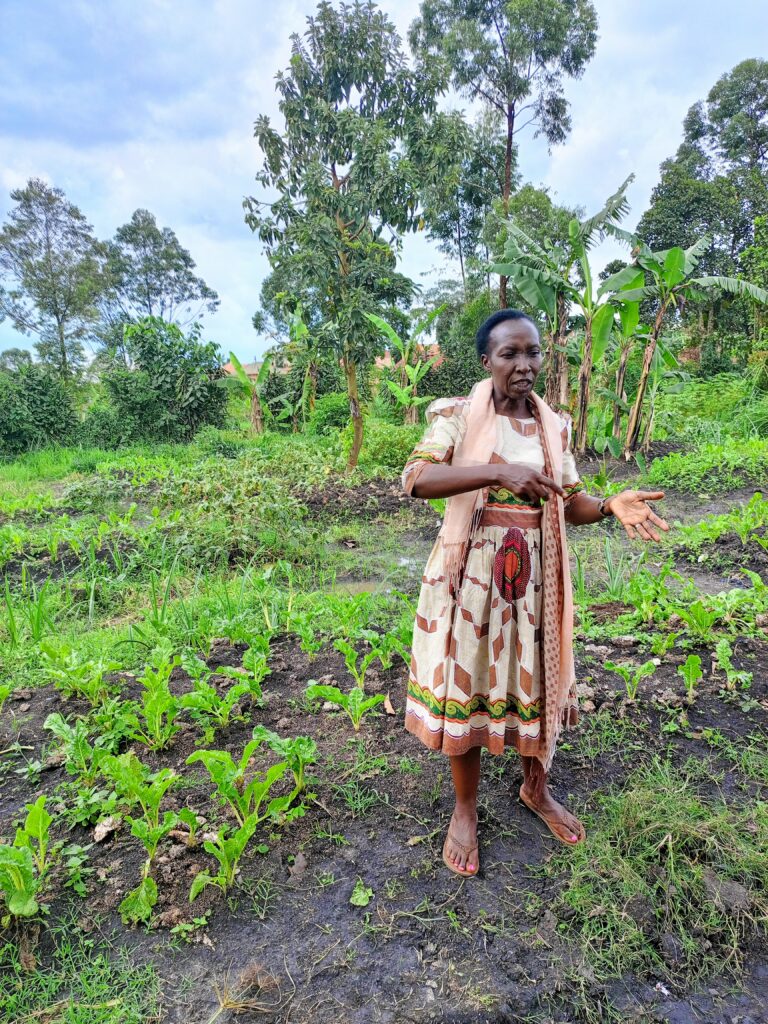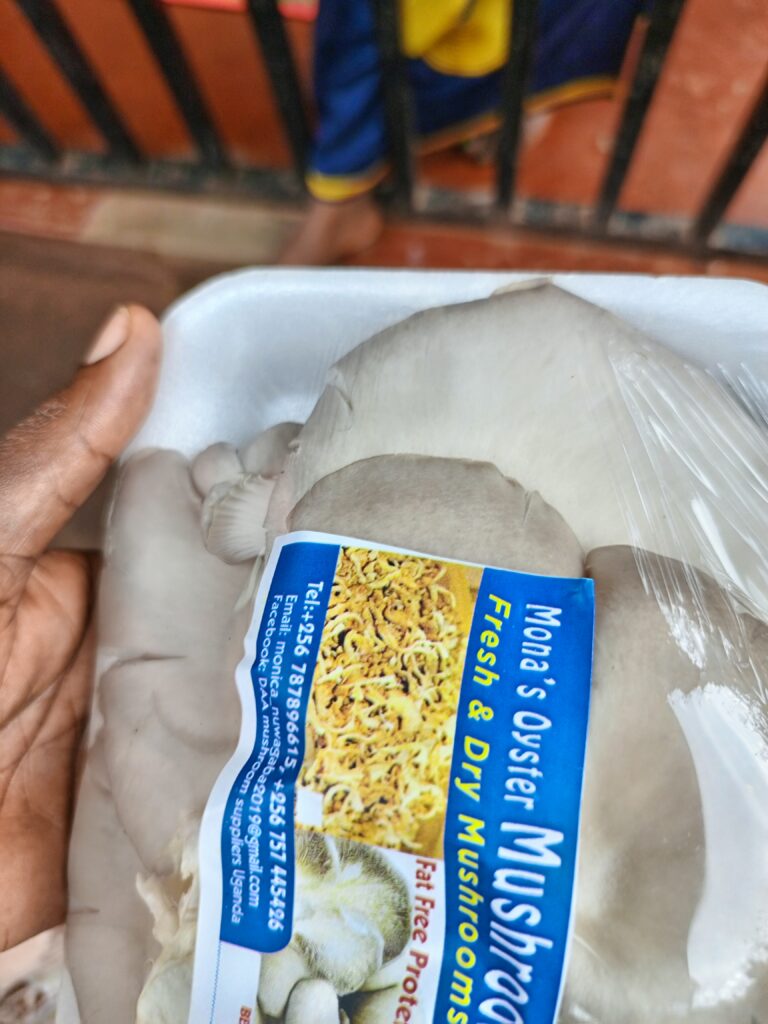Ahumuza Muhumuza
Monica Nuwagaba started her farm with only her hands as her capital. She cleared her land and tended the crops the first few months.
“Having grown up in a village setting, I knew all about how to raise to crops,” she says. “I was no stranger to hard work, not afraid to get my hands dirty”. When Nuwagaba was young, her mother had made sure the family always had spring onions, spinach and other vegetables growing in their yard.
A teacher by profession, Nuwagaba returned to gardening in 2018, after realising she was spending a lot of money on groceries which she could grow. “I had a sick mother-in-law at home, and she needed a balanced diet, which, among other things comprised a lot of vegetables and mushrooms,” Nuwagaba says.
She grows organic vegetables, herbs and spices on slightly more than an acre of land in a lush valley a stone’s throw away from her home in Kasangati, Wakiso Distrioct. She also grows staple food crops such as bananas, maize and sweet potatoes in this garden.
Nuwagaba starts off some of the vegetable seedlings in her compound at home, before transplanting them to the main garden. This profuse nursery bursts forth with an eclectic mix of strawberries, spinach, sukuma wiki, rosemary, coriander, mint, and other herbs and spices. In addition, there are also rows of lettuce, Amaranthus, spring onions, broccoli, pawpaw and pumpkins.
Her garden is divided into patches of five by six metres, each surrounded by water. Because of these water-filled moats, she is able to produce regardless of whether it is rainy or dry season. During dry spells, Nuwagaba goes through the labour-intensive process of manually irrigating her crops using a watering can. She hopes to get a sprinkler system to ease the backbreaking work of ferrying water manually to each vegetable patch.
Though passionate about farming, Nuwagaba’s business was also born out of need; sometimes she could not find the greens her patient at her home needed, especially during the coronavirus-induced lockdown when movement was severely restricted.
Growing organically
Nuwagaba has never used pesticides, herbicides or any other chemicals in her garden as she believes these are carcinogenic. One of the ways she manages pests and diseases is by always keeping a keen eye on her vegetables. A farmer who obsessively checks on their plants, and immediately plucks out those that have been affected, can avert an infestation before it spreads. Nuwagaba also uses rabbit urine as an organic pesticide, sprinkling it on the plants to deter pests from devouring them. She uses residue from mushroom farms as manure.

Involving family
They say charity begins at home; Nuwagaba’s first customers are her immediate family. Her husband, a civil servant, buys vegetables from her every week, money which she puts to buying seeds. Her children, too, are involved in the garden, one way or another. During their school breaks, she herds them to the garden to get hands-on training, preparing them for when they eventually get to run it.
Nuwagaba also markets the vegetables and mushrooms to health-conscious consumers. She earns sh50,000 a day from the vegetables alone.
But she wants to add value to her harvests, for example, by drying the spinach and mill it into flour. She got the idea during the lockdown when so many people had a lot time and were therefore growing their own vegetables, causing the market to thin.
Challenges
However, Nuwagaba’s farming journey has not been without its challenges. Because her farm is not enclosed, neighbours and passers-by take the liberty to harvest from her property. “Instead of simply plucking off spinach or sukuma wiki leaves like a sensible person would do, those who come to steal my vegetables pluck out the whole plant, roots and all.” To add insult to the injury, some of them let their cows, goats and other livestock free range on her farm, taking her delicious array of vegetables for an all-you-can-eat buffet.
What is she planning to do about this challenge?
Grey Oyster mushrooms
Nuwagaba started out as a mushroom farmer and that is where her passion lies. She earns an extra income from selling products for a network of mushroom growers in Kasangati. She explains that the demand for mushrooms in the country is higher than farmers can meet. That is why she is eager to promote the growing of mushrooms in the country.
Mushrooms do not need a lot of space or light to grow. The gardens she takes us to inspect are growing intensively in a small room; taking up every available space on shelves, between the aisles and hanging along all the walls. Each small black polythene bag (kaveera) is referred to as a ‘garden’ (in mushroom growers’ terms) and the room contains 1,000 of these. Each of these tiny gardens has a shelf life of three to four months, during which it produces one and a half kilogrammes of mushrooms. After four months, production does not stop, but reduces, so many farmers opt to sell off or dispose of their gardens.
The room where they grow is well-aerated, mushrooms need to breath, but there are nets between the wooden sluts to keep rats out. The floor has a generous sprinkling of charcoal dust to absorb the moisture. Nuwagaba explains that watering of the gardens is done twice a day using sprinklers during the rainy season. During the dry season, when temperatures are high, the mushrooms are watered more than three times a day. Mushrooms need to remain in cool conditions as they grow and the roof is thatched with papyrus reeds to insulate it from the sun.
Marketing the mushrooms
Nuwagaba packages her mushrooms in different quantities which are priced at sh2,500 to sh15,000 depending on the season.
The mushrooms are sold to supermarkets, schools, hotels hospitals and individual households. They are prized for their high nutritional value, containing carbohydrates, vitamins, fats, proteins and vital nutrients such as calcium, sodium and magnesium.
From research, Nuwagaba has learnt that mushrooms are recommended for patients with cancer, diabetes, high blood pressure and several others.

Challenges in mushrooming growing
Pests such as snails and insects enjoy munching on mushrooms, yet one cannot spray pesticides since mushrooms are sold fresh, without washing. “Mushrooms go bad quickly if they are washed since they absorb water,” Nuwagaba explains. The farm is planning to install insect traps and use other methods to deter pests.
Right now, the farmer relies on a supplier for spawn. Not all suppliers are trustworthy, some may not inform you that the spawn is of a low quality, and you end up with lower germination rates than you had anticipated.
Each piece of spawn costs sh1,000. Spawn for 50 gardens, therefore, costs sh50,000.
Each garden produces one and a half kilogrammes during its lifetime, earning the farmer about sh10,500 in total. That means from 50 gardens which can fit on just one shelf, a farmer can earn sh525,000. If one deducts the costs of production, the farmer remains with more than sh300,000 in profit.
The small shed costs about sh3m to construct and takes 1,000 gardens. Mushrooms hang from several strings throughout the room, like strange oversized fruit.
Nuwagaba wants to ensure every household knows the value of mushrooms. “The more they know, the more you can sell,” she says.
Plans
She hopes to add value to the mushrooms before selling them by making wine. In addition, she also hopes to dry and process the mushrooms into flour to mix with other ingredients such as pumpkin, wheat and millet flour to make porridge, kebabs, cakes and other snacks.
What others say
Hamza Waiswa, caretaker
I grew up in this area, therefore I know how to farm on this kind of terrain. I benefit from the farm in a number of ways. I do a lot of work on the farm such as digging the water trenches and piling the soil into these patches to reclaim the land. From this farm, I have earned a living that helps me feed my family. Nuwagaba also lets us harvest vegetables from her garden for our home consumption.
Rindani Kobusingye, neighbour
I sometimes help out with the weeding and other odd jobs around the farm. Nuwagaba is a good person and I have learned a lot from her. She does not despise people, but is a conflict solver. Nuwagaba helps us by providing work and paying us in a timely manner. She also lets us have some of the vegetables, which helps us with nutrition, especially for me who has a young baby.






